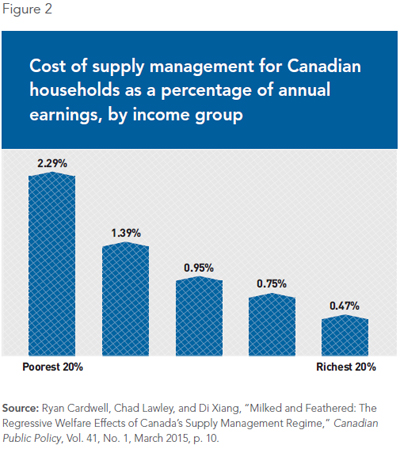Last updated on June 21, 2015
I talked about this a few months ago when I discussed the article by Ryan Cardwell et al. in Canadian Public Policy, but here is more, from a short article by the Montreal Economic Institute:
The main purpose of Canada’s supply management policies, implemented for dairy, poultry and eggs in the 1970s, was to protect farmers from price fluctuations. These policies have three main components: 1) fixing prices, 2) establishing tariff barriers in order to keep lower-priced foreign goods out, and 3) managing supply with quotas so as to avoid price-depressing overproduction.
The beneficiaries of these policies, at least at first glance, are Canada’s 13,500 dairy, poultry, and egg farms, representing about 1/8 of all farms in the country. However, supply management hurts all 35 million Canadian consumers by forcing them to pay consistently more for milk, chicken, and eggs, as well as for other products that use these foodstuffs as ingredients.
Importantly, supply management disproportionately hurts poor Canadians. According to a recent study by researchers from the University of Manitoba, supply management imposes an additional cost of $554 a year on the richest 20% of households, representing 0.47% of their incomes. In contrast, the corresponding burden for the poorest households ($339 a year) represents 2.29% of their incomes. These policies are therefore heavily regressive, hurting poor households almost five times as much as rich households.
